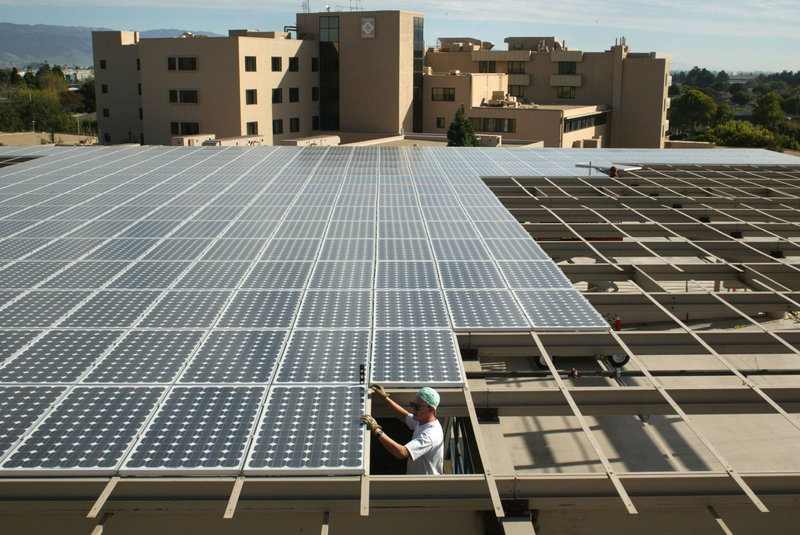BEIJING — Chinese solar panel makers that grew fast over the past decade are suffering big losses due to slumping global sales and a price war that threaten an industry seen by communist leaders as a role model for hopes to transform China into a technology leader.
Another looming challenge: Moves by the United States and Europe toward imposing possible anti-dumping tariffs on Chinese-made solar panels that might further depress sales.
Financial problems are likely to force painful changes in the Chinese industry including possible mergers, bankruptcies, factory closures or layoffs, industry analysts say.
“The next 1 1/2 years will be very challenging,” said Frank Haugwitz, a renewable energy consultant in Beijing.
Companies have been hurt by weak sales, especially in debt-crippled Europe, the leading global solar market, but also by Chinese government policies that encouraged hundreds of small companies to rush into the industry. They flooded the market and depressed prices.
Five major Chinese manufacturers, including industry leaders Suntech Power Holdings Ltd. and Yingli Green Energy Ltd., reported total losses of nearly $250 million in the latest quarter. One of them, LDK Solar Co., also reported an eye-popping loss of $588.7 million the previous quarter.
Pioneers such as Suntech, Yingli and Trina Solar Ltd. that were founded before 2005 grew to become some of their industries biggest competitors as Germany, Spain and other European countries promoted solar power with subsidies and low-cost loans.
Suntech’s founder, Shi Zhengrong, a Chinese-born Australian scientist, was lauded by the communist government as a leading entrepreneur. Industry profits soared in 2007-09 as the United States and other new markets stepped up installations.
That success encouraged communist authorities who saw solar, wind and other renewable energy as a way both to curb China’s growing reliance on imported oil and gas and to take the lead in an emerging industry without established competitors.
Solar power, along with such fields as biotechnology and aerospace, was declared a “strategic emerging industry” targeted for development as part of efforts to transform China from a low-wage country of farmers and factory workers into a creator of technology.
Beijing provided grants and low-cost loans. Local leaders encouraged companies to start producing solar panels or components to make them. The field promised higher-paying jobs and a political payoff for officials who would be seen to support a key national initiative.
Producing the basic element of a solar panel – the hand-size black solar cell made of polysilicon that converts the sun’s light into electricity – is relatively simple using equipment that a new company can buy as a kit from European suppliers. That allowed novices to start production quickly, while bigger manufacturers also assemble the cells into power-generating modules.
New companies still were springing up in 2011 even after Western countries that were hammered by the global crisis cut subsidies and other support. Supplies surged as sales growth stalled, forcing sellers to slash prices to unprofitable levels.
Since 2010, the price of polysilicon wafers used to make solar cells has plunged by 73 percent, according to Aaron Chew and Francesco Citro, analysts for Maxim Group, a financial firm in New York City. The price of cells has fallen by 68 percent and that of modules by 57 percent.
“The solar manufacturing industry has been wracked by a collapse in pricing,” said Chew and Citro in a report.
The major Chinese manufacturers have accumulated a total of $17.5 billion in debt, leaving balance sheets “at the breaking point,” they said.
Beijing is unlikely to allow major producers to go bankrupt but rescue measures might include capital injections that would dilute or wipe out the value of shares held by foreign investors who have put billions of dollars into the industry, Chew and Citro said.
Haugwitz said people in the industry have told him at least 300 smaller manufacturers have suspended production and others are producing at below 50 percent of their capacity.
The industry also faces the potential impact of U.S. and European anti-dumping measures in response to complaints Beijing improperly subsidizes companies. Foreign competitors complain that allows Chinese suppliers to sell abroad at unfairly low prices, wiping out American and European jobs abroad – an explosive issue at a time of high unemployment.
Send questions/comments to the editors.



Success. Please wait for the page to reload. If the page does not reload within 5 seconds, please refresh the page.
Enter your email and password to access comments.
Hi, to comment on stories you must . This profile is in addition to your subscription and website login.
Already have a commenting profile? .
Invalid username/password.
Please check your email to confirm and complete your registration.
Only subscribers are eligible to post comments. Please subscribe or login first for digital access. Here’s why.
Use the form below to reset your password. When you've submitted your account email, we will send an email with a reset code.